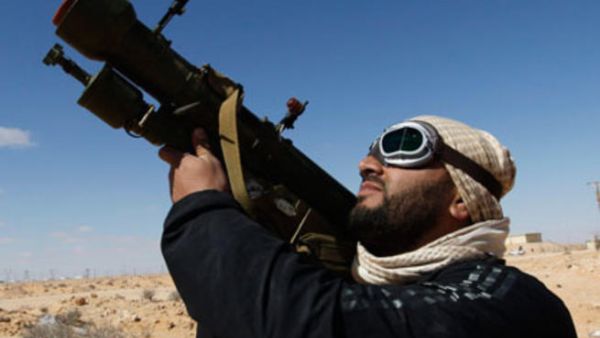As part of a disarmament drive organised by the army to target militia groups, and following appeals on a private television station, Libya al-Hurra (Free Libya) hundreds of Libyans handed in weapons left over from last year's revolution at points indicated by the authorities in the main squares of Benghazi and Tripoli
The latest call followed similar ones in August, but this time it appears to have gained traction in the wake of the attack against the US consulate in Benghazi in which the American ambassador and three other Americans staff members were killed during protests supposedly against the video that was produced in the US and that insults the Muslim religion. Those incidents sparked resentment of armed militias.
Assault rifles, anti-aircraft guns, rocket launchers and even tanks were among military hardware handed in. The Libyan government estimates that 200,000 people in Libya possessed weapons after the ousting of the former Libyan dictator, Muammar Gaddafi.
In the aftermath of the incidents that led to the death of the US ambassador Christopher Stevens' death 11 September, 11, Mohammed Magarief, the president of the general assembly, vowed to disband all illegal militias. The government has called on all militias to disband or join a command centre co-ordinating between the army and the militias.
In Benghazi alone, one of the organisers, said that over 800 citizens had handed in weapons at the main collection point, and over 600 different types of arms were collected. Libya's intention to rid its streets of arms and crack down on rogue militia groups, was heard.
In Tripoli, the organisers who received the weapons at Martyrs' Square reported that two tanks were among the weapons handed in by at least 200 former fighters.
Al-Hurra TV transmitted live footage of the collection and transfer of weapons to military barracks on Saturday night
While hoping that the collection of weapons would also expand to other Libyan cities, the army's chief-of-staff, Yussef al-Mangoush said Libyans needed stability. He said: "They are handing over weapons to the military so that they are kept in the right place and not on the streets."
The government had relied on many militias for security during the turmoil following last year's ousting and killing of long-time leader Muammar Gaddafi.
Most of Libya's militias emerged during the eight-month war against Gaddafi, but others sprang up after the end of fighting last October. With the country trying to rebuild after the 42-year dictatorship, the groups paid little attention to successive interim leaders.
They were accused of bullying citizens, operating independent prisons and holding summary trials for Gaddafi loyalists. Recently Islamist-led militias have also attacked shrines, such as tombs associated with religious figures they consider counter to their strict interpretation of Islam.
Former anti-Gaddafi fighters were among those who reportedly gave up their weapons to the army during the current drive after previous attempts to disarm the people have had little support and many still appeared to feel safer carrying weapons.
Previously the government attempted a number of disarmament schemes, including offering people jobs in exchange for handing over their weapons, or offering to buy guns. However, those offers had shown few results.
Most of the Libyan people handing arms to the authorities now seem to understand that Libya needs to move on from the stage of the revolution to state building. They don't need the weapons any more if they want to help establish a new, safe Libya, and most certainly following the expulsion of the militias. They are now trusting the national army to protect them

Libya's weapons amnesty should clear the country of armed militias







